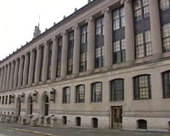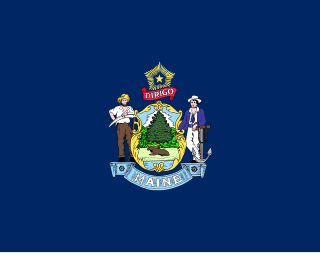
Bangor is a city in the U.S. state of Maine, and the county seat of Penobscot County. The city proper has a population of 33,039, making it the state's 3rd largest settlement behind Portland (66,882) and Lewiston (36,221).

The Penobscot River is a 109-mile-long (175 km) river in the U.S. state of Maine. Including the river's West Branch and South Branch increases the Penobscot's length to 264 miles (425 km), making it the second-longest river system in Maine and the longest entirely in the state. Its drainage basin contains 8,610 square miles (22,300 km2).
Patricia Helen LaMarche is an American political figure and activist with the Green Party of the United States; she was the party's vice-presidential candidate in the 2004 U.S. presidential election, with David Cobb as its presidential candidate, and was one of seven co-chairs of the party's national committee, the Green Party of the United States, elected to that position on July 24, 2005.

John Bapst Memorial High School is a private, independent, college preparatory high school in Bangor, Maine, United States. It serves approximately 500 ninth through twelfth grade students from 50 different communities in the region. The majority of students who attend John Bapst Memorial High school come from the towns of Orrington, Glenburn, Veazie, Dedham, School Administrative District 63, Milford, Bradley, and Orland. In 2011-2012 the school became a residential international school and now also serves approximately 50 international students from China, Vietnam, Korea, Kazakhstan, Spain, Germany, Austria, Albania, Egypt, and elsewhere.

Maine's 2nd congressional district is a congressional district in the U.S. state of Maine. Covering 27,326 square miles (70,770 km2), it comprises nearly 80% of the state's total land area. It is the largest district east of the Mississippi River and the 24th-largest overall. It is the second-most rural district in the United States, with 72.11% of its population in rural areas, behind only Kentucky's 5th congressional district.
Crime in St. Louis includes an overview of crime both in the city of St. Louis and in the Greater St. Louis metropolitan area. Crime in the city increased from the 1960s through the early 1990s as measured by the index crime rate, followed by a decline in crime rates through 2014. Despite decreasing crime, rates of violent crime and property crime in both the city and the metropolitan area remain higher than the national metropolitan area average. In addition, the city of St. Louis consistently has been ranked among the most dangerous cities in the United States. As of April 2017, St. Louis has the highest murder rate in America. At the end of 2017, St. Louis metropolitan had 205 murders with only 159 within the city limit. The new Chief of Police, John Hayden said two-thirds (67%) of all the murders and one-half of all the assaults are concentrated in a triangular area in the North part of the city.
Hate crime laws in the United States are state and federal laws intended to protect against hate crimes motivated by enmity or animus against a protected class of persons. Although state laws vary, current statutes permit federal prosecution of hate crimes committed on the basis of a person's protected characteristics of race, religion, ethnicity, nationality, gender, sexual orientation, gender identity, and disability. The U.S. Department of Justice (DOJ)/FBI, as well as campus security authorities, are required to collect and publish hate crime statistics.
Crime in the United States has been recorded since colonization. Crime rates have varied over time, with a sharp rise after 1963, reaching a broad peak between the 1970s and early 1990s. Since then, crime has declined significantly in the United States, and current crime rates are approximately the same as those of the 1960s.

Kenduskeag Stream is a 36.2-mile (58.3 km) stream in the U.S. state of Maine. It is a tributary of the Penobscot River. The stream rises at the outlet of Garland Pond in the town of Garland, and flows southeast through Corinth, Kenduskeag, and Glenburn, before it reaches the city of Bangor. Passing through downtown Bangor, the stream drops 100 feet (30 m) in 2 miles (3 km), flowing into the Penobscot between the two downtown bridges across the larger river. Kenduskeag means "eel weir place" in Penobscot.
Bangor High School, a member of the Bangor School System, is a high school in Bangor, Maine. It has an enrollment of approximately 1,200 students in grades 9–12.
Alfred James "Al" Brady was an Indiana-born armed robber and murderer who became one of the FBI's "Public Enemies" in the 1930s. He and an accomplice were shot dead in an ambush by FBI agents in downtown Bangor, Maine, in 1937. The spectacular public gun-battle that led to the demise of "The Brady Gang" is an essential part of Maine history, and was even the subject of a re-enactment in 2007.
John L. Martin is an American politician of the Democratic Party. Martin has been in Maine politics since his first election to the Maine House of Representatives in 1964, and is sometimes called "The Earl of Eagle Lake" as a result. With his election in 2014, he is the longest serving legislator in Maine history.

Sean Faircloth is an American writer and politician from Maine, he served as the State Senator for Bangor, Maine, as Mayor until November 2016 and as of 2017 he is serving as a Bangor City Councilor. He is also an attorney and five-term state legislator. While in the legislature, Faircloth was appointed to the Judiciary and Appropriations Committees. In his final term, Faircloth was elected Majority Whip. Faircloth's first book published by Pitchstone Press, Attack of the Theocrats! How the Religious Right Harms Us All - and What We Can Do About It was released in February 2012. His second book, The Enchanted Globe, a fantasy adventure story that teaches geography, was published in 2016.

Janet Trafton Mills is an American lawyer and politician serving as the 75th Governor of Maine, since January 2019. She previously served as the Attorney General of Maine on two separate occasions.
This article refers to crime in the U.S. state of Michigan.

Nancy Torresen is a United States District Judge of the United States District Court for the District of Maine. She is the first female judge to serve in the District of Maine.
Aaron M. Frey is an American lawyer and politician serving as the 58th Attorney General of Maine since 2019. He formerly served as a Democratic representative in the Maine House of Representatives.










